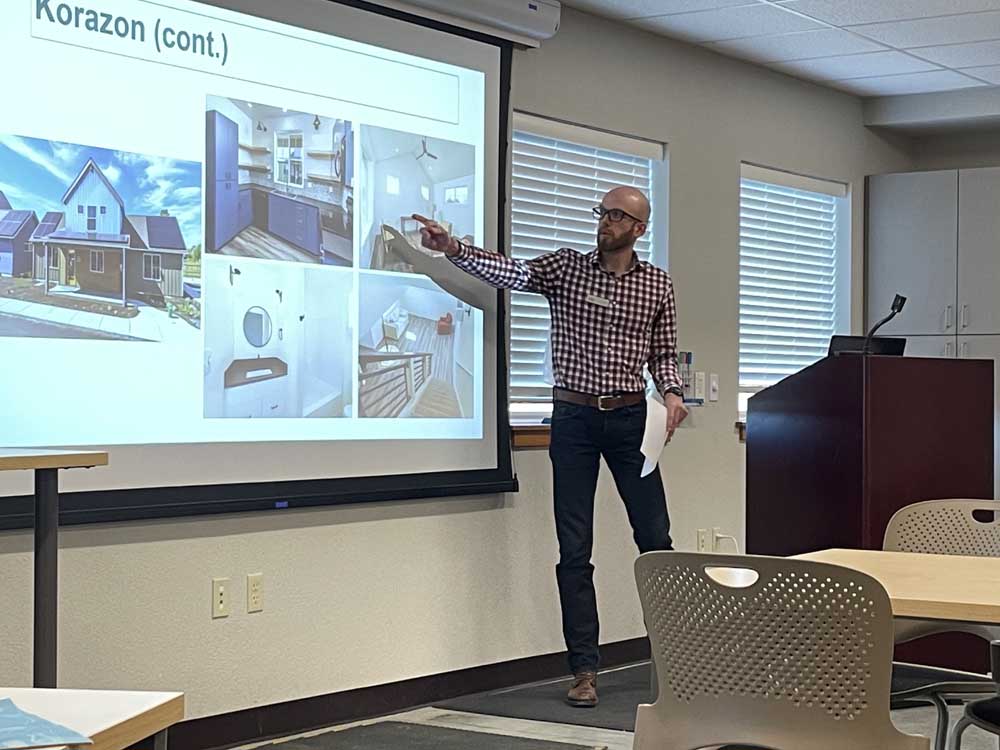The Environmental Center hosts energy forum in Redmond
Published 5:00 pm Saturday, November 19, 2022

- Brian Durbin, fiscal director of the Kor Community Land Trust, discusses energy and affordable housing Saturday at the Environmental Center's first Local Energy Forum at the Oregon State University Extension Service in Redmond
REDMOND — The Environmental Center hosted its first Local Energy Forum at the Oregon State University Extension Service in Redmond Saturday, where experts and members of the community discussed topics that included electric vehicles, energy efficient and affordable housing, and sustainability in schools.
Deschutes County Commissioner Phil Chang spoke at the forum, sharing some methods to create renewable energy that could be used locally.
Emilie Marlinghaus, of Bend, attended the forum Saturday and said she has been interested in climate change since the 1980s.
The topic of energy is all part of addressing the climate crisis.
“I’ve always envisioned Bend being this leader. We had this opportunity to really think outside the box and make bold moves,” Marlinghaus said.
“Since this is a county energy plan the big obstacle right now is getting support from the county commissioners to pass the plan.”
Marlinghaus said over the years she has seen some pretty dramatic changes in Bend, and is no longer certain if Bend will become the leader she envisioned. But she is hopeful.
In his presentation Chang brought up possible opportunities for Deschutes County to become more sustainable, such as harnessing the power within biomass and biogas processes, which are both ways to extract energy that otherwise would be lost. These methods are in addition to hydro-electric and solar power, which are both being used in Deschutes County.
In order to convince the public of the opportunity in biomass and biogas renewable energy, “a lot of stars need to be in alignment,” Chang said.
He said it is important to create incentives and to make the case for making the long term investments into a more sustainable future. Convincing the public of the value and benefits and providing enough subsidies to match those benefits is all part of it, he said. Also reminding people of how important resilience is, is another way of making the case.
“Reminding people of how vulnerable we are to global energy supply interruptions, and the economic impacts of that — I think that is something lots of people get,” Chang said. “And showing people the jobs that are possible… We can create jobs and we can put ourselves in a more economically secure position in the long run.”
Neil Baunsgard, of the Environmental Center, spoke on local policy and transportation electrification. He also mentioned a new round of federal funding to the state of Oregon through the Oregon National Electric Vehicle Infrastructure Plan.
“Within the next five years, we will have well developed charging infrastructure, above and beyond what we already have, all the way up and down Highway 97, Highway 20, Highway 26,” Baunsgard said. “So those directions are going to be better electrified, where there is a charging hub at a minimum of every 50 miles on all of those corridors.”
Baunsgard said getting people to try eclectic vehicles, whether it is an eclectic bike, car or bus, is the best method to get communities to adopt the trend.
“Change is hard, and it is right to be skeptical and think through all the unintended consequences. But when people choose electric transportation, people very rarely go back,” Baunsgard added. “It is not new anymore, it is a pretty exciting future.”






